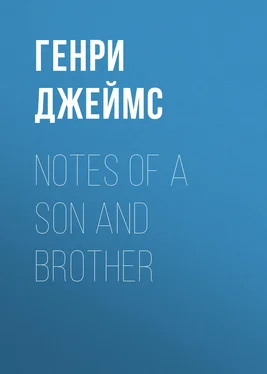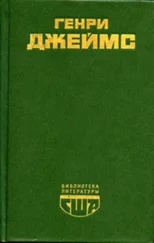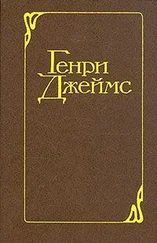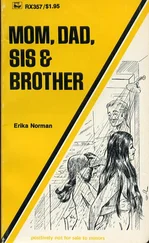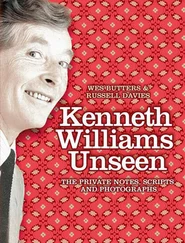Генри Джеймс - Notes of a Son and Brother
Здесь есть возможность читать онлайн «Генри Джеймс - Notes of a Son and Brother» — ознакомительный отрывок электронной книги совершенно бесплатно, а после прочтения отрывка купить полную версию. В некоторых случаях можно слушать аудио, скачать через торрент в формате fb2 и присутствует краткое содержание. Жанр: foreign_prose, foreign_antique, на английском языке. Описание произведения, (предисловие) а так же отзывы посетителей доступны на портале библиотеки ЛибКат.
- Название:Notes of a Son and Brother
- Автор:
- Жанр:
- Год:неизвестен
- ISBN:нет данных
- Рейтинг книги:4 / 5. Голосов: 1
-
Избранное:Добавить в избранное
- Отзывы:
-
Ваша оценка:
- 80
- 1
- 2
- 3
- 4
- 5
Notes of a Son and Brother: краткое содержание, описание и аннотация
Предлагаем к чтению аннотацию, описание, краткое содержание или предисловие (зависит от того, что написал сам автор книги «Notes of a Son and Brother»). Если вы не нашли необходимую информацию о книге — напишите в комментариях, мы постараемся отыскать её.
Notes of a Son and Brother — читать онлайн ознакомительный отрывок
Ниже представлен текст книги, разбитый по страницам. Система сохранения места последней прочитанной страницы, позволяет с удобством читать онлайн бесплатно книгу «Notes of a Son and Brother», без необходимости каждый раз заново искать на чём Вы остановились. Поставьте закладку, и сможете в любой момент перейти на страницу, на которой закончили чтение.
Интервал:
Закладка:
This view of the inevitable fate of distinguished work was thus, on my part, as it comes before me again, of early development, and I admit that I should appear to antedate it hadn't I in renewed presence of each of the particular predestined objects of sacrifice I have glanced at caught myself in the very act of that invidious apprehension, that fondest contemporaneity. There were the charming individual things round the production of which I had so at once elatedly and resignedly circled; and nothing remained at the end of time but to test the historic question. Was the quiet chamber of the Boston museum a constitution of poetic justice long awaited and at last fully cognisant?—or did the event perhaps fail to give out, after all, the essence of our far-away forecast? I think that what showed clearest, or what I, at any rate, most sharply felt, was the very difficulty of saying; which fact meant of course, I recognise, that the story fell a little short, alas, of rounding itself off. Poetic justice, when it comes, I gather, comes ever with a great shining; so that if there is any doubt about it the source of the doubt is in the very depths of the case and has been from the first at work there. It literally seems to me, besides, that there was more history and thereby more interest recoverable as the matter stood than if every answer to every question about it hadn't had a fine ambiguity. I like ambiguities and detest great glares; preferring thus for my critical no less than for my pedestrian progress the cool and the shade to the sun and dust of the way. There was an exquisite effort of which I had been peculiarly sure; the large canvas of the view of the Paradise Rocks over against Newport, but within the island and beyond the "second beach"—such were our thin designations! On the high style and the grand manner of this thing, even though a little uneasy before the absence from it of a certain crânerie of touch, I would have staked every grain of my grounded sensibility—in spite of which, on second thoughts, I shall let that faded fact, and no other contention at all, be my last word about it. For the prevailing force, within the Boston walls, the supreme magic anything was to distil, just melted into another connection which flung a soft mantle as over the whole show. It became, from the question of how even a man of perceptive genius had painted what we then locally regarded as our scenery, a question of how we ourselves had felt and cherished that scenery; which latter of these two memories swept for me everything before it. The scenery we cherished—by which I really mean, I fear, but four or five of us—has now been grossly and utterly sacrificed; in the sense that its range was all for the pedestrian measure, that to overwalk it was to love it and to love it to overwalk it, and that no such relation with it as either of these appears possible or thinkable to-day. We had, the four or five of us, the instinct—the very finest this must have been—of its scale and constitution, the adorable wise economy with which nature had handled it and in the light of which the whole seaward and insular extension of the comparatively futile town, untrodden, unsuspected, practically all inviolate, offered a course for the long afternoon ramble more in harmony with the invocations, or for that matter the evocations, of youth than we most of us, with appreciation so rooted, were perhaps ever to know. We knew already, we knew then, that no such range of airs would ever again be played for us on but two or three silver strings. They were but two or three—the sea so often as of the isles of Greece, the mildly but perpetually embayed promontories of mossy rock and wasted thankless pasture, bathed in a refinement of radiance and a sweetness of solitude which amounted in themselves to the highest "finish"; and little more than the feeling, with all this, or rather with no more than this, that possession, discrimination, far frequentation, were ours alone, and that a grassy rocky tide-washed, just a bare, though ever so fine-grained, toned and tinted breast of nature and field of fancy stretched for us to the low horizon's furthest rim. The vast region—it struck us then as vast—was practically roadless, but this, far from making it a desert, made it a kind of boundless empty carpeted saloon. It comes back to me that nobody in those days walked, nobody but the three or four of us—or indeed I should say, if pushed, the single pair in particular of whom I was one and the other Thomas Sargeant Perry, superexcellent and all-reading, all-engulfing friend of those days and still, sole survivor, of these, I thus found deeply consecrated that love of the long, again and again of the very longest possible, walk which was to see me, year after year, through so many of the twists and past so many of the threatened blocks of life's road, and which, during the early and American period, was to make me lone and perverse even in my own sight: so little was it ever given me then, wherever I scanned the view, to descry a fellow-pedestrian. The pedestrians came to succumb altogether, at Newport, to this virtual challenge of their strange agitation—by the circumstance, that is, of their being offered at last, to importunity, the vulgar road, under the invasion of which the old rich alternative miserably dwindled.
V
Nothing meanwhile could have been less logical, yet at the same time more natural, than that William's interest in the practice of painting should have suddenly and abruptly ceased; a turn of our affair attended, however, with no shade of commotion, no repining at proved waste; with as little of any confessed ruefulness of mistake on one side as of any elation of wisdom, any resonance of the ready "I told you so" on the other. The one side would have been, with a different tone about the matter and a different domestic habit than ours, that of my brother's awkwardness, accompanying whatever intelligence, of disavowal, and the other been our father's not unemphatic return to the point that his doubts, those originally and confidently intimated, had been justified by the fact. Tempting doubtless in a heavier household air the opportunity on the latter's part to recall that if he had perfectly recognised his son's probable progress to a pitch of excellence he had exactly not granted that an attainment of this pitch was likely in the least, however uncontested, to satisfy the nature concerned; the foregone conclusion having all the while been that such a spirit was competent to something larger and less superficially calculable, something more expressive of its true inwardness. This was not the way in which things happened among us, for I really think the committed mistake was ever discriminated against—certainly by the head of the family—only to the extent of its acquiring, even if but speedily again to fade, an interest greater than was obtainable by the too obvious success. I am not sure indeed that the kind of personal history most appealing to my father would not have been some kind that should fairly proceed by mistakes, mistakes more human, more associational, less angular, less hard for others, that is less exemplary for them (since righteousness, as mostly understood, was in our parent's view, I think, the cruellest thing in the world) than straight and smug and declared felicities. The qualification here, I allow, would be in his scant measure of the difference, after all, for the life of the soul, between the marked achievement and the marked shortcoming. He had a manner of his own of appreciating failure, or of not at least piously rejoicing in displayed moral, intellectual, or even material, economies, which, had it not been that his humanity, his generosity and, for the most part, his gaiety, were always, at the worst, consistent, might sometimes have left us with our small savings, our little exhibitions and complacencies, rather on our hands. As the case stood I find myself thinking of our life in those years as profiting greatly for animation and curiosity by the interest he shed for us on the whole side of the human scene usually held least interesting—the element, the appearance, of waste which plays there such a part and into which he could read under provocation so much character and colour and charm, so many implications of the fine and the worthy, that, since the art of missing or of failing, or of otherwise going astray, did after all in his hands escape becoming either a matter of real example or of absolute precept, enlarged not a little our field and our categories of appreciation and perception. I recover as I look back on all this the sense as of an extraordinary young confidence, our common support, in our coming round together, through the immense lubrication of his expressed thought, often perhaps extravagantly working and playing, to plenty of unbewildered rightness, a state of comfort that would always serve—whether after strange openings into a sphere where nothing practical mattered, or after even still quainter closings in upon us of unexpected importances and values. Which means, to my memory, that we breathed somehow an air in which waste, for us at least, couldn't and didn't live, so certain were aberrations and discussions, adventures, excursions and alarms of whatever sort, to wind up in a "transformation scene" or, if the term be not profane, happy harlequinade; a figuration of each involved issue and item before the footlights of a familiar idealism, the most socialised and ironised, the most amusedly generalised, that possibly could be.
Читать дальшеИнтервал:
Закладка:
Похожие книги на «Notes of a Son and Brother»
Представляем Вашему вниманию похожие книги на «Notes of a Son and Brother» списком для выбора. Мы отобрали схожую по названию и смыслу литературу в надежде предоставить читателям больше вариантов отыскать новые, интересные, ещё непрочитанные произведения.
Обсуждение, отзывы о книге «Notes of a Son and Brother» и просто собственные мнения читателей. Оставьте ваши комментарии, напишите, что Вы думаете о произведении, его смысле или главных героях. Укажите что конкретно понравилось, а что нет, и почему Вы так считаете.
